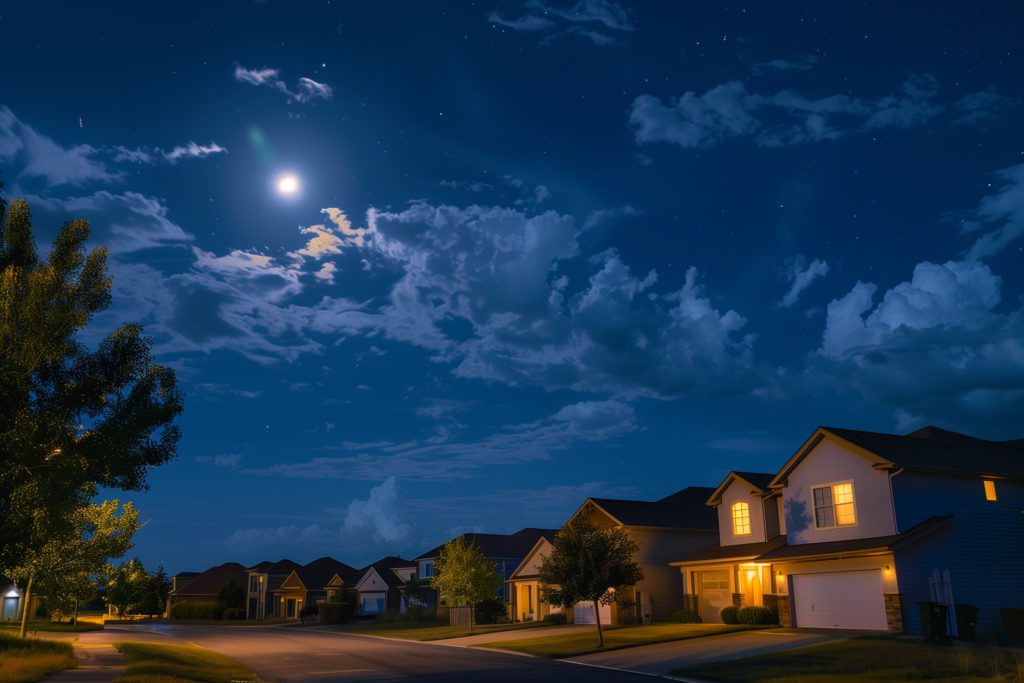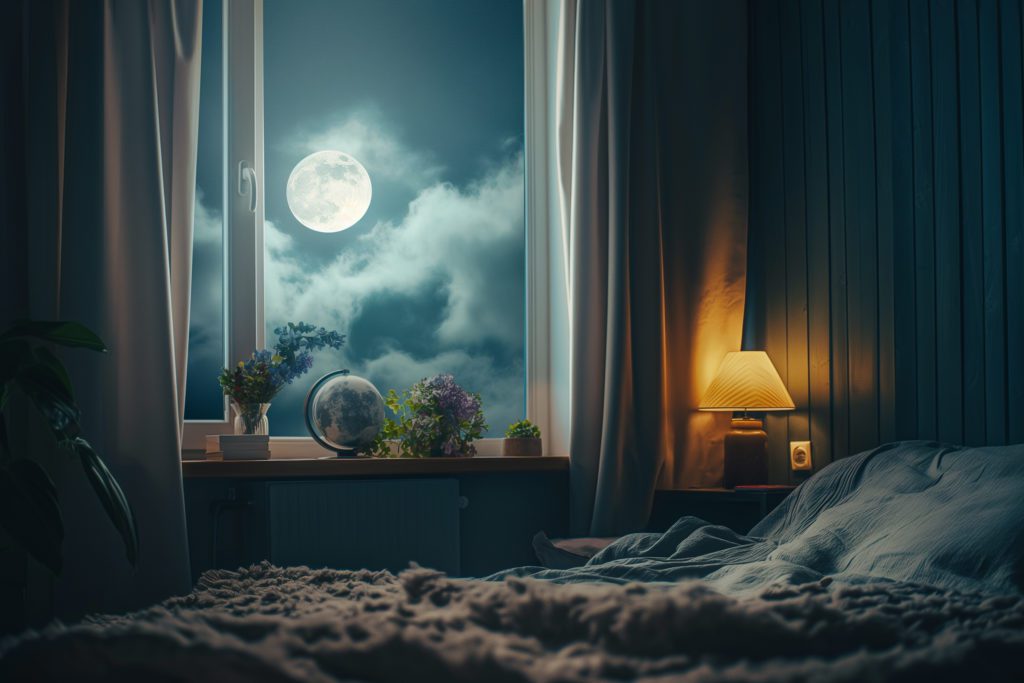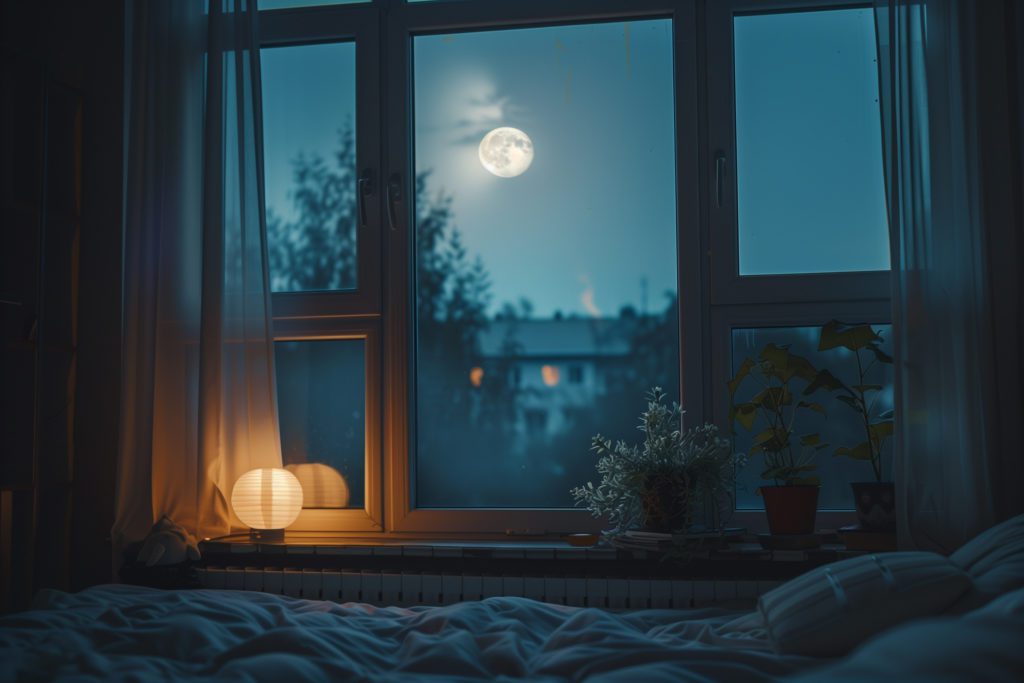
Does the Moon Affect Your Sleep?
Find Out About This Unexpected Connection
The moon gives off light, electromagnetism, and gravitational pulls. Explore whether these factors can influence your sleep and how.

It affects the tides, offers a guide for time, and serves as a source of light, especially when full; there’s a lot in the natural world affected by the moon. The word lunacy even stems from the 15th century when people believed that the moon’s phases could cause people to be more or less aggressive.
The moon, in some cultures, is revered and worshiped; in others, the center of haunting tales of what goes bump in the night, such as werewolves.
Is there any truth to the influence of the moon? Well, we’re not saying that the moon will cause you to sprout hair and howl at it, but the moon may be affecting your sleep more than you think.
Theories on the Moon’s Influence
There are three primary theories on how the moon may affect your sleep, and they center around its light, gravity, and electromagnetism.
Light
When it comes to the moon, the easiest to explore connection is whether how much light it gives off, which relates to its phase, affects your sleep. As expected, a full moon gives off the most light, so studies typically look into how sleep changes around a full moon to better understand if moonlight can affect sleep.
Light is already a well-understood regulator of your circadian rhythm, which regulates your sleep-wake cycle. Specifically, though, your body uses sunlight to identify when it’s daytime; when the sun goes down and the light dims, your body starts readying for bed. However, the full moon, by giving off more light than the other phases, may trick the body into thinking it’s not time to sleep yet.
Still, it’s important to remember that the brightness of the moon is only 7% that of the sun, which is still a low intensity. If anything, you’re more likely to be affected by the artificial light from inside your house than you are to be affected by the light given off by the moon.
Gravity
This theory that the moon’s gravitational pull can affect human health is based on the knowledge that our bodies are mostly composed of water, and, as we know, the moon can affect water, as evident by ocean tides. However, when considering the amount of water in the ocean versus how much is in our bodies, the moon likely has very little sway over our bodies.
Still, some research suggests that the moon’s gravitational pull may trigger the release of neurohormones, such as melatonin. This may be one way in which the moon’s appearance in the sky helps to signal sleep.
Electromagnetism
In addition to its possible influence over gravity, another hypothesis is that the moon can cause electromagnetic fluctuations on Earth.
The electromagnetic field of Earth has a long tail that is shaped by solar winds. During the moon’s full moon phase, it passes through this tail and becomes negatively charged. This charge can then influence Earth’s electromagnetic field.
Emerging research suggests that we may be more sensitive to geomagnetic variations than expected. For example, geomagnetic storms and the Northern Lights, which are both geomagnetic events with fluctuations comparable to the moon’s impact, have been connected to health effects such as blood pressure and blood flow changes, headaches, heart rate variability, and heart attacks.
The reason behind these influences remains unclear, but the theories involve the influence of electromagnetism over the body’s hormones, inflammation, and DNA breaks.
How the Moon Affects Sleep
Now that we’ve examined the possible ways in which the moon may affect sleep, let’s dive into one of the few studies investigating the effects of a full moon on sleep.
The study utilized four test groups: three from rural Argentinian communities, each having varying exposure to artificial light, and one of university students in Seattle. The study found that in every scenario, no matter their geography or electricity access, the participants went to bed later in the days leading up to the full moon and slept less.
With this evidence, it appears that light is the greatest contributor to the moon’s effects on sleep, although research is still incomplete when it comes to the moon’s influences.
The moon’s effects on sleep may also take a pit stop at another connection: mental health disorders. Specifically, a small study found that those with bipolar disorder saw rapid changes between the phases of depression and mania that synced with the lunar cycle, possibly because of its disruption to their circadian rhythm.
Thus, the moon may affect those with BPD by influencing their sleep, or the greater cycling of BPD phases may cause poorer sleep.
How to Sleep Better, No Matter the Moon’s Phase
If you’re looking to sleep better, you likely don’t need to worry so much about the moon, at least not until scientists better understand what, if any, influence it has on your well-being.
That being said, one area where research has shown a connection is regarding the light given off by a full moon. With a dark room being an important component of good sleep, anything you can do to prevent the moon’s light from keeping you up will help you sleep better.
Use black-out curtains to block out the moonlight or try an eye mask to ensure no light disrupts your sleep. Even before going to bed, stepping away from windows and instead using dim lighting inside may help to better prepare your body for sleep.
Besides limiting the moon’s light in your bedroom, other ways to get better sleep, no matter the moon’s phase, include:
- Create a relaxing bedtime routine with activities such as reading, journaling, or listening to soothing music.
- Take a warm bath a little before bed; the cooling of your body afterward helps to stimulate sleepiness.
- Block out noises using a fan, colored noises (like those available on the Pillow app), or with ear plugs.
- Keep it cool by turning down the thermostat, using a fan, or opting for lighter pajamas.
- Avoid caffeine for at least 6 hours before bed, maybe even more if you find that you’re sensitive to it.
- Avoid napping, but if you do nap, cap it at 20 minutes.
- Keep a consistent sleep schedule and wake up at the same time each day, even on the weekends.
Following these tips can help you sleep better and create a routine that even the changing moon phases can’t disrupt.
FAQ
Can a full moon really make it harder to sleep?
It might! Some studies suggest that people sleep less and go to bed later in the days leading up to a full moon, possibly because of the extra light. But compared to artificial light from screens, moonlight has a much smaller impact on sleep.
Is there a connection between the moon and weird dreams?
Possibly! Some people report having more vivid or strange dreams during a full moon. If the moon is affecting sleep quality, this could lead to more fragmented REM sleep, which is when dreams are most intense.
Can the moon influence melatonin levels?
There’s some speculation that the moon’s gravitational or electromagnetic effects might impact melatonin, the hormone that regulates sleep. However, any effect is likely very small compared to artificial light exposure.
Do different moon phases affect sleep differently?
Studies mainly focus on full moons since they produce the most light, which may delay sleep. Other phases likely have little to no impact, but individual experiences can vary.
Could the moon be affecting my baby’s sleep?
Some parents say their babies wake more often during a full moon, but there’s little scientific proof. Babies tend to wake frequently anyway, and sleep disruptions are more likely caused by growth spurts, teething, or sleep regressions.
Can full moons cause insomnia?
Some people report having trouble falling asleep during a full moon, and studies suggest slight sleep disturbances might occur. However, the effect is small compared to things like stress, screen time, and caffeine intake.

Written by
Jessica G
Medical writer freelancer who has written hundreds of articles on varying topics. Masters of Engineering degree in Biomedical Engineering.
Download Pillow
Get help
Press & News
Legal
Connect
X (Twitter)
Company
Copyright © Neybox Digital Ltd.



